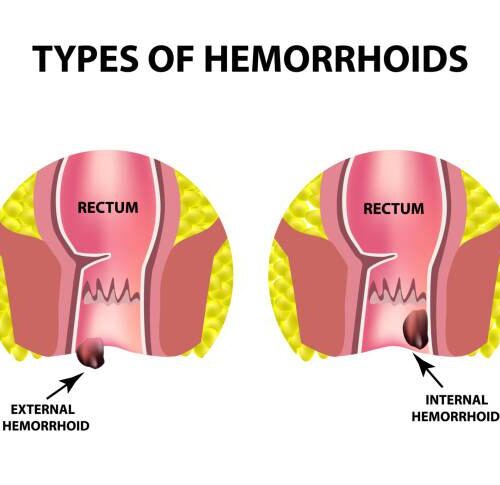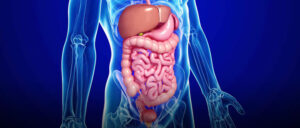Haemorrhoids - Symptoms, Causes, Prevention & Homeopathic treatment

Piles (Haemorrhoids)
Haemorrhoids are swollen and inflamed blood vessels (veins) in the rectum and anus.
Piles are broadly classified as follows:
External: Piles that are outside the anal verge
Internal: Piles that occur inside the rectum
Causes of Piles:
These include the following:
- Genetic predisposition (weak rectal veins, walls)
- Poor muscle tone in the rectal region
- Constipation
- Obesity
- Sedentary lifestyle
- Chronic cough
- Pregnancy
- Overuse of laxatives or enemas
- Lifting heavy weights ha
Symptoms of Piles:
Symptoms vary depending upon the site of piles, duration of complaints and general health of the person.
External piles present as a swelling outside the anus with irritation and itching. These can be painful sometimes and usually do not bleed.
Internal piles are usually not painful but these bleed when they are irritated such as during the passage of hard stools. They can be classified into four grades:
- Grade 1 piles are small swellings on the inside lining of the anus. They cannot be seen or felt from outside the anus.
- Grade 2 piles are partly pushed out (prolapse) from the anus when you go to the toilet, but quickly ‘retract back’ inside again.
- Grade 3 piles hang out (prolapse) from the anus and are felt as one or more small, soft lumps that hang from the anus. However, they can be pushed back inside the anus with a finger.
- Grade 4 piles permanently hang down from within the anus, and cannot be pushed back inside. They can sometimes become quite large.
Some of the other symptoms generally associated with piles are:
- Protrusion of piles outside the anus; this usually occurs after defecation, prolonged standing or unusual physical exertion
- Bleeding from the anus: This can occur before, during or after stools. This will be bright red blood, not usually mixed with the stools, but often seen on the toilet paper.
- Soreness, pain, itching in the anal region
- In the case of profuse bleeding that is chronic, the patient may be anemic
- The sensation of something coming down, or a bulge or lump at the anus
- If the piles outside the anus develop a blood clot inside, (thrombosed piles) it leads to a particularly tender, hard lump.
Why you should choose Homeopathy for Piles?
- Homeopathic medicines are very effective in the management of piles and the symptoms associated with it such as pain, bleeding, itching, etc.
- The point to be emphasized is that the relief of symptoms is obtained with absolute gentleness and without invasion or surgery of any kind.
- Moreover, the condition has high relapse rate following surgical treatment, since surgery does not target the root causes like genetic tendencies, habitual constipation, etc.
- Homeopathic medicines work at the root level and can modify these genetic tendencies thus reducing chances of relapse and recurrence of the condition significantly.
- Grade 1 and 2 of internal piles treatment can be significantly helped with homeopathy.
- Grade 3 piles can find some relief of symptoms with homeopathy but may not be completely cured.
- Grade 4 piles can get symptomatic relief with medicines.
To summarize:
Homeopathy is effective in all the stages of Piles (Haemorrhoids), however if treatment is started in early stages it can give permanent relief.
Tips on how to prevent piles
Piles if not controlled in time can create problems in the long run, follow the tips below for preventing piles.
- Increase the intake of fluids (Juices and water)
- High fibre diet
- Exercise regularly
- Sit in a warm water tub for a minimum of 10 minutes
- Eat more fresh fruits and vegetables
- Avoid processed foods
- Control your weight
- Avoid too much of alcohol
- Quit smoking
Overview
Hemorrhoids, also known as piles, are swollen veins in the lower rectum or anus that can cause discomfort and pain. They are a common condition and can be classified into two types: internal hemorrhoids, which occur inside the rectum, and external hemorrhoids, which occur under the skin around the anus. Understanding hemorrhoids, their symptoms, causes, and treatment options—including homeopathic approaches—can aid in effective management and relief.
Symptoms
Hemorrhoids can cause a variety of symptoms depending on their type and severity:
Internal Hemorrhoids:
- Painless Bleeding: Bright red blood on toilet paper or in the toilet bowl after a bowel movement.
- Prolapse: Hemorrhoids that protrude from the rectum during bowel movements but retract on their own.
- Itching or Irritation: Mild itching or irritation inside the rectum.
External Hemorrhoids:
- Pain and Discomfort: Painful, sore lumps around the anus, especially during bowel movements or sitting.
- Itching and Irritation: Intense itching or irritation in the anal area.
- Swelling: Swelling or a noticeable lump around the anus.
- Bleeding: Bright red blood on the toilet paper or in the toilet bowl.
When to See a Doctor
Consult a healthcare provider if you experience:
- Persistent Symptoms: Ongoing pain, bleeding, or discomfort that does not improve with over-the-counter treatments.
- Significant Bleeding: Heavy bleeding or blood clots that may indicate a more serious condition.
- Severe Pain: Severe or worsening pain that affects daily activities.
- Changes in Bowel Habits: Noticeable changes in bowel habits or persistent symptoms despite dietary and lifestyle changes.
- Uncertain Diagnosis: Uncertainty about the cause of symptoms or concern about other potential conditions.
Causes
Hemorrhoids can be caused by various factors, including:
- Increased Pressure: Excessive pressure on the veins in the rectal area from prolonged sitting, heavy lifting, or straining during bowel movements.
- Constipation: Chronic constipation leading to straining and pressure on the rectum.
- Pregnancy: Increased pressure on the pelvic veins during pregnancy can lead to hemorrhoids.
- Obesity: Excess weight contributing to increased pressure on the veins.
- Chronic Diarrhea: Frequent bowel movements and irritation from diarrhea can contribute to hemorrhoid formation.
- Age: Aging can weaken the tissue supporting the veins in the rectal area, leading to hemorrhoids.
Risk Factors
Several factors can increase the likelihood of developing hemorrhoids:
- Family History: A family history of hemorrhoids or other related conditions.
- Pregnancy: Hormonal changes and increased pressure during pregnancy.
- Prolonged Sitting: Long periods of sitting, particularly on the toilet, can increase pressure on the rectal veins.
- Straining: Frequent straining during bowel movements due to constipation or diarrhea.
- Diet: Low-fiber diet that contributes to constipation and straining.
- Sedentary Lifestyle: Lack of physical activity contributing to poor bowel function and increased risk.
Complications
If left untreated, hemorrhoids can lead to several complications:
- Thrombosed Hemorrhoids: Blood clots forming in external hemorrhoids, causing severe pain and swelling.
- Anemia: Chronic bleeding from hemorrhoids leading to anemia.
- Infection: Risk of infection in external hemorrhoids or cracks around the anus.
- Strangulated Hemorrhoids: Internal hemorrhoids that become trapped outside the anus and lose their blood supply, leading to severe pain and potential tissue death.
- Difficulty in Bowel Movements: Increased discomfort and difficulty in passing stool due to pain and swelling.
Preventions
Preventing hemorrhoids involves lifestyle and dietary changes:
- Increase Fiber Intake: Eat a high-fiber diet to prevent constipation and ease bowel movements.
- Stay Hydrated: Drink plenty of water to maintain soft stools and prevent straining.
- Exercise Regularly: Engage in regular physical activity to promote healthy bowel function.
- Avoid Prolonged Sitting: Take breaks and avoid sitting for long periods, especially on the toilet.
- Practice Good Hygiene: Maintain good anal hygiene to prevent irritation and infection.
- Use Proper Bowel Habits: Avoid straining during bowel movements and respond promptly to the urge to defecate.
Can Homeopathy Help?
Homeopathy offers a holistic approach to managing hemorrhoids by addressing individual symptoms and underlying causes. A homeopathic practitioner can provide personalized remedies and treatment plans tailored to the individual’s specific symptoms and overall health.
Diagnosis
Diagnosing hemorrhoids typically involves:
- Medical History: Detailed review of symptoms, medical history, and potential contributing factors.
- Physical Examination: Inspection of the anal area and rectum for signs of hemorrhoids.
- Digital Rectal Examination: A physical examination of the rectum to assess the presence and condition of hemorrhoids.
- Anoscopy: Use of an anoscope to visually inspect the anal canal and lower rectum.
- Colonoscopy: If necessary, to rule out other conditions and examine the entire colon.
Treatments
Treatment for hemorrhoids often includes a combination of approaches:
- Over-the-Counter Medications: Use of topical creams, ointments, or suppositories to reduce pain and inflammation.
- Lifestyle Modifications: Dietary changes, increased fiber intake, and improved bowel habits.
- Minimally Invasive Procedures: Procedures such as rubber band ligation, sclerotherapy, or infrared coagulation to treat internal hemorrhoids.
- Surgical Interventions: Surgical removal of hemorrhoids for severe cases or when other treatments are ineffective.
- Pain Management: Use of analgesics or warm sitz baths to relieve pain and discomfort.
Lifestyle and Home Remedies
Supporting recovery from hemorrhoids through lifestyle changes and home remedies can be beneficial:
- Warm Sitz Baths: Soak in a warm bath for 15-20 minutes to relieve pain and reduce swelling.
- Cold Compresses: Apply cold compresses or ice packs to the affected area to reduce swelling and discomfort.
- High-Fiber Diet: Increase intake of fiber-rich foods such as fruits, vegetables, and whole grains.
- Proper Hydration: Drink plenty of fluids to prevent constipation and support healthy bowel movements.
- Avoid Irritants: Use gentle, non-irritating hygiene products and avoid excessive wiping or harsh cleaning methods.
Preparing for Your Appointment
To make the most of your appointment with a healthcare provider or homeopathic practitioner, consider:
- Document Symptoms: Keep a detailed record of symptoms, including any bleeding, pain, or discomfort.
- List Medications and Supplements: Provide information about any current medications, supplements, or treatments.
- Prepare Questions: Write down any questions or concerns regarding your diagnosis, treatment options, and overall management.
- Health History: Share a comprehensive overview of your health history, including previous conditions or treatments related to hemorrhoids.

